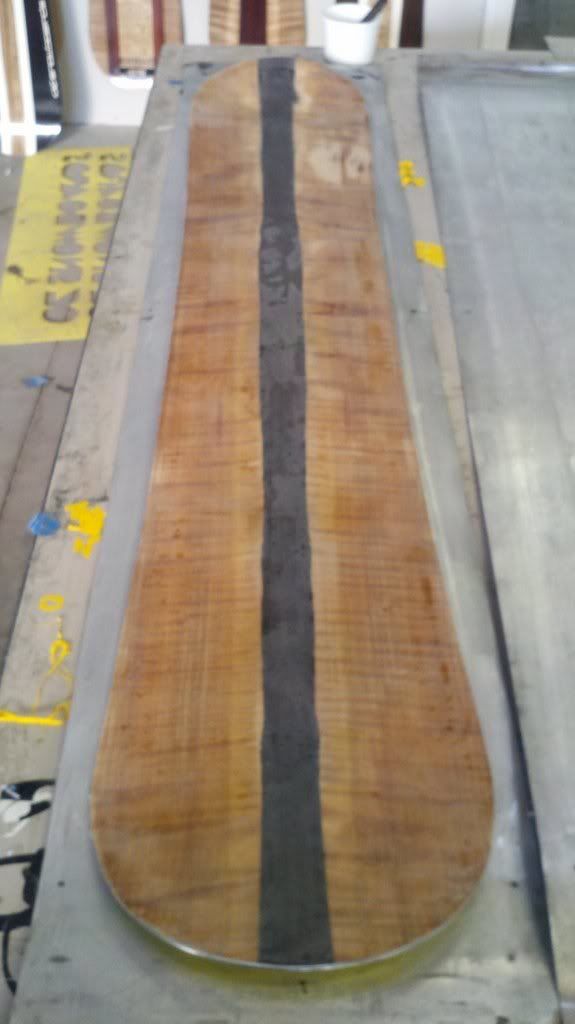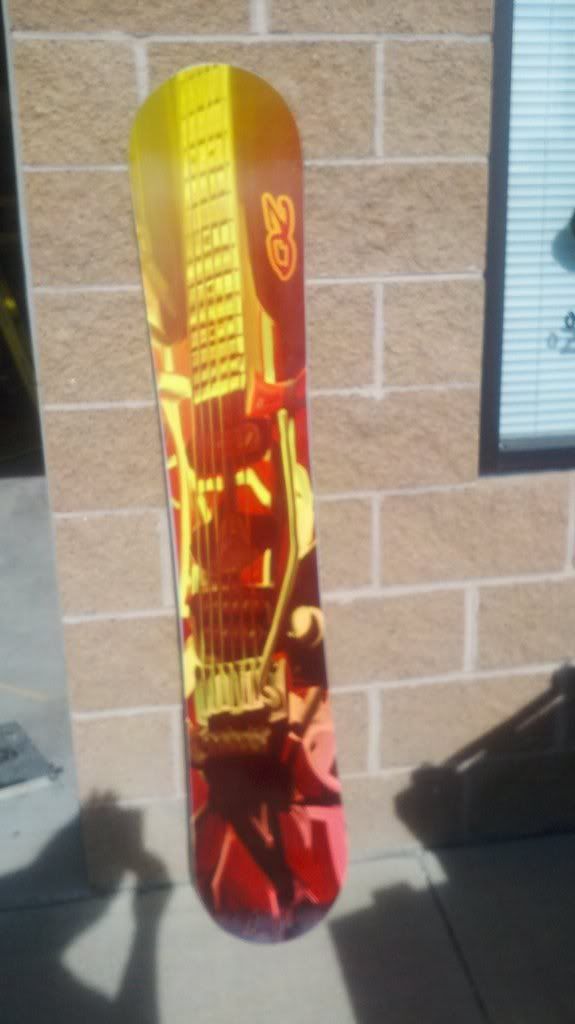Page 1 of 1
Top sheet after 1st press
Posted: Fri Sep 23, 2011 8:10 am
by COsurfer
I made a board where the veneered top sheet didnt turn out like I wanted it to so I sanded it down, put on some epoxy and repressed the board with a new top sheet. Came out looking great! Do you think this method is a durable as a typical top sheet included in the layup?
Before:

After:

Posted: Fri Sep 23, 2011 8:29 am
by twizzstyle
Looks great!
No reason it won't be just as durable as a normal layup, as long as you sanded the top well and get a solid bond. It might just be a hair heavier cause it's sort of an extra layer of epoxy that wouldn't otherwise be there, but I bet you can't measure the difference.
Posted: Fri Sep 23, 2011 8:35 am
by COsurfer
Thanks Twizz, thinking in more detail about this process you could make a bunch of blanks that could have any top sheet added to them later. Good for production work
Posted: Fri Sep 23, 2011 8:50 am
by skidesmond
Yup, I've done that before also.
CoSurfer - Wouldn't surprise me if 1/2 the "stuff" coming out of china is done that way. Make a basic ski, put a customized/personalized top sheet on it. Wah-Lah!
Posted: Fri Sep 23, 2011 2:11 pm
by agiocochook
I toured the K2 factory back in the '80's, and out of the same stack, grey blanks were getting graphics for a K2 model (812, maybe?....), a Pre model and a model for short-lived Mahre Brothers ski company.....so went my innocence....
Posted: Fri Sep 23, 2011 2:15 pm
by agiocochook
...Vashon Island factory, btw....though I guess that is offshore...
Posted: Sat Sep 24, 2011 1:29 am
by falls
I guess you could also press with a white topsheet and then sublimate the graphic on afterwards too.
Your second topsheet should be fine.
If it was done within maybe 24 hours after the initial press then the epoxy should actually chemically bond to the original epoxy. If more time had elapsed then it will simply be a mechanical bond and the abrasion is essential.
Posted: Sat Sep 24, 2011 4:40 am
by Richuk
Like the end result dude. What was the problem with the first result?
On the point raised and given you are setting up your factory with production in mind, then, it's not wasteful (time/resources) to heat the product twice? It doesn't effect the epoxy long term? Are you going to explain all that extra process in your price? Heating the core before it goes into the press (dimensional stability) you can explain - but the epoxy?
If you are thinking about blanks and QA options i.e separation of graphic and board QA failures, then there are ways of applying a peel layer that will create the textured surface you require for bonding. This means it would come out of the press with the surface you require and you can then bond without the use of heat and give you customers choice.
Post press sublimation ... at 200oC ((((
Anyway dude ... you're tearing it up! Applauding the rise of the micro ski factory movement )))
Posted: Sat Sep 24, 2011 9:45 am
by MontuckyMadman
Pretty darn sure it permanently damages the epoxy matrix to heat it up to 180F a second time and doing a sub after the cure would be real bad I think. Its fine if its for you as you assume the risk but for a customer no go I would say.
Posted: Sat Sep 24, 2011 2:24 pm
by COsurfer
Hey Rich, thanks for the comments. On the first layup I tried to press with exposing the carbon fiber below and have two wood veneers on each side. As I was trying to sand it flat for poly I sanded through the veneer as you can see at the back of the board.
do you have any recommendations on a peel layer? I was just thinking of pressing with the fiberglass as the top layer and then sanding lightly to create a bondable surface.
MM, excellent point. I just emailed entropy to see what their thoughts are on the process.
Posted: Sun Sep 25, 2011 2:32 am
by Richuk
Suggest you speak to your epoxy supplier and see what they recommend (I don't have the in-depth knowledge). The two sides of the problem appear to be the peel layer (something about fluorocarbons) and the bonding agent.
Here are a few links on the subject:
http://books.google.co.uk/books?id=p2D6 ... ng&f=false
http://books.google.co.uk/books?id=UFVN ... ng&f=false
http://www.adhesionassociates.com/paper ... 950072.pdf
http://books.google.co.uk/books?id=Fl57 ... ng&f=false
Posted: Mon Sep 26, 2011 5:13 pm
by COsurfer
Quote from Desi @ Entropy
"Re-pressing the board should not be a problem. One thing to keep in mind though is when you want to bond to an already cured surface, its best to do a light sand to the cured surface so that you get good adhesion to the new layer. Epoxy (all glues for that matter) do not like to stick to smooth surfaces so roughening will help get a good bond. Nothing crazy just some 150grit should do the trick."
Posted: Tue Sep 27, 2011 2:21 am
by Richuk
Cool CO.
Not sure what materials you are using, but is there any benefit in using what these guys are calling a 'smart' cure cycle. It appears to be a partial cure with rapid cooling and then full cure - would give you are reason to explain (market) to your clients.
http://mcdm.hanyang.ac.kr/8.%20Smart%20 ... stress.pdf
... you might have to keep them in the freezer between pressings ... ooops!
Posted: Tue Sep 27, 2011 6:41 pm
by COsurfer
Freezer....son of a b#$%, just another piece of equipment to buy some day! ahhh probably not.
I will try this method soon. I just landed a deal with a local micro brew for a few promo boards to launch a new beer. I thought with this method I could press and make sure the board has no flaws(denting) or if it does I could fill them in before pressing the top sheet. I will post the results.
Posted: Wed Sep 28, 2011 4:03 pm
by Brazen
Congrats on the work!




